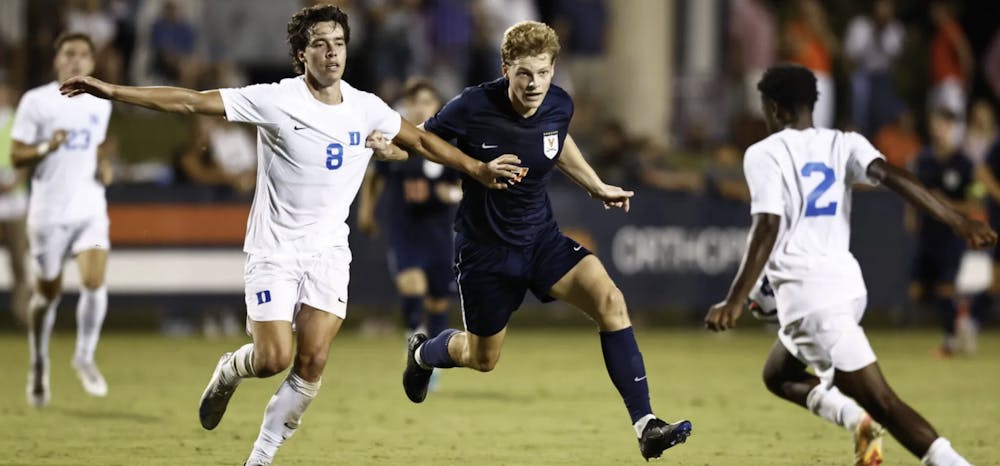Virginia men’s soccer fell 1-0 to Duke in its opening ACC game Friday at Klöckner Stadium. The lone score came via a Cavalier (2-2-1, 0-1-0 ACC) own goal turned in by junior defender Nick Dang. The Blue Devils’ (3-1-1, 1-0-0) cross had seemed, as Dang swung his foot, to be going anywhere but the net. Instead it went backward, shanked across the line and proved to be the decisive moment in Virginia’s home defeat.
“Ball got wide, and Nick got beat to the spot,” Coach George Gelnovatch said about the goal postgame. “Nick’s guy lost him. He’ll learn. He’ll be better from it.”
Duke has become the Cavaliers’ scourge. Not since 2019 has Virginia beaten them, a long and barren stretch that extended to six games Friday. On a cool Klöckner night, a fountain of fans filled the metal bleachers and grass hill to see the Cavaliers attempt to break it.
Duke controlled possession for the first 15 minutes, moving the ball but seldom creating dangerous opportunities. Virginia seemed content to exist out of possession — to press a little, but not too hard and without much haste — and instead grow into the game.
That had been the plan Gelnovatch laid out Monday against Maryland. It seemed, in those 15 minutes, to be working quite the same way. There was a hidden problem, though, known only to Virginia, whose teeth would soon emerge — that was not the plan this time.
“It wasn’t, to be honest,” Gelnovatch said. “I have to look at some things.”
Defensively, though, the Cavaliers generally withstood the pressure. They bent but seldom broke.
“For all the pressure they put on us and the disruption that they caused, they still didn’t create a ton of good scoring chances,” Gelnovatch said. “And that’s what’s frustrating to me.”
Each team placed one shot on goal in the entire game. Duke’s came in the first half on a looping volley by graduate midfielder Luke Thomas, whose effort was tipped over the bar by senior goalkeeper Joey Batrouni.
Batrouni encountered little other action, but he tried his hardest to counter the problems plaguing his team. He repeatedly encouraged them to move up the field during a period in which the hosts just could not get quality possession.
“A lot of that comes from their pressure,” Gelnovatch said. “They didn’t allow us to get into our rhythm of possession.”
The rhythm never really came. The Blue Devils just kept battering and seemed to break through late in the first half when a cross swung into the six-yard box, falling for Duke graduate forward Adam Luckhurst. He sent it into the roof of the net and went gallivanting off into the corner to celebrate with a crush of teammates, but the goal was later canceled out after it was determined Luckhurt used his hand in the build-up play.
In that moment, the crowd erupted with hope that it might be a turning point. But the Blue Devils got their goal on the unlucky moment involving Dang, who has been arguably Virginia’s best player in this fledgling season. He is the defense’s immovable stalwart and the team’s leading scorer. He is the last guy who would commit an error like this, unfortunate as it was.
Virginia, regardless, could never recover. It never really established a foothold in the game, never really threatened. Only in the final 20 minutes did chances start flowing, when Duke elected to sit in and barricade itself, praying for a result.
“It’s always scary down the stretch when you’re only up a goal and one bounce either way could go in their favor,” Duke Coach John Kerr said.
But that never happened. It took Virginia until the 74th minute to register its solitary shot on goal, a deflected cross that tumbled into Duke graduate goalkeeper Wessel Speel’s waiting arms. The screams and shouts from the desperate crowd came with almost unhinged urgency.
The final chance came on a corner kick with 30 seconds left. Batrouni came forward and the bleachers clattered once again, but a defender headed the cross away, ending play.
Concerns are mounting for the Cavaliers, about their capacity to retain possession against strong teams and their ability to grind out results in tough games. One lapse and no goals doomed a dominant performance against Colgate — the same thing happened Friday.
“In the end of the world scenario, you get a point in this game,” Gelnovatch said.
But this is familiar territory. It is, in fact, the exact trajectory of the last two seasons. Two seasons ago, Virginia started 2-2-0 with a troubling loss to Xavier and a humiliating defeat to Maryland. Last season, the Cavaliers started 3-2-0 with an eyebrow-raising loss to Loyola Marymount and a 2-0 defeat against Duke.
Both seasons turned out quite fine. Much better than fine, actually. The 2022 team earned the NCAA Tournament No. 4 seed, and the 2023 team the No. 7 seed. There is plenty of time to turn this season around.
There is no better place to start than the present. Virginia will next play Friday at Wake Forest. The game will kick off at 7 p.m. and air on ACC Network Extra.







